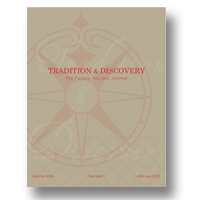|
3.
|
Tradition and Discovery: The Polanyi Society Periodical:
Volume >
48 >
Issue: 2
Mel Keiser
The Personal as Postcritical and Theopoetic:
Exploring Religion and Poetry in Polanyi’s Tacit Dimension
abstract |
view |
rights & permissions
| cited by
Exploring Polanyi on religion in Personal Knowledge and Meaning as mystical, metaphoric, and mythic as well as ritual and belief, I seek to clarify the meaning of the personal through a lens combining postcritical and theopoetic perspectives. Stanley Hopper’s theopoetic similarly criticizes, and seeks unconscious depths beneath, modern dualism, deepening Polanyi’s discussion of the religious efficacy of figural language. The personal for Polanyi embraces tacit commitment, from-to emergence, communal connectedness, creativity shaping our world, integrating self and world through figural language, process of discovery, and affirmation of God as presence and integrative agency in our existence and understanding. Poteat deepens the personal with effects of first-person-singular grammar. While affirming via negativa, letting go of frameworks, Polanyi insists traditional frameworks are essential to religion. He criticizes modern poetry for shattering Christian frameworks. Not recognizing religion in its fragments, he misses an unrealized potential for understanding religion as the depths of the tacit dimension. Letting go all frameworks, thoughts, rules, and goals in the via negativa, we dwell in mystery within which God presences through evocation of poetic images, and we experience our personhood as elusive selves enveloped in and impelled by divine Mystery.
|
|
|
4.
|
Tradition and Discovery: The Polanyi Society Periodical:
Volume >
48 >
Issue: 2
Clemens Wieser
The Development of Pedagogical Competence in Tacit Knowing:
Towards a Polanyian Framework for the Empirical Analysis of Competence Development
abstract |
view |
rights & permissions
| cited by
Polanyi’s theory of personal knowledge provides a paradigmatic conceptual framework for the empirical analysis of tacit knowing and learning. We use this framework to analyze the development of pedagogical competence. Drawing on Polanyi, we regard pedagogical competence as a particular field of professional tacit knowing that relates subsidiary and focal awareness of events in class, effects situated appraisal, and relates events to teaching intentions. The development of pedagogical competence takes place when a teacher struggles to relate teaching intentions to ongoing events in tacit knowing and engages in situated experimentation. Based on Polanyi’s conception of subsidiary awareness, focal awareness, and appraisal, we present an empirical vignette from a case study. In it, a teacher engages in situated experimentation to resolve two opposing semantic fields in class: an intended field of interaction, which focuses on the lesson topic, and the field of student peer relations. Based on our analysis, we argue that the teacher’s competence development is focused on the educative task of managing students’ peer culture, while the teacher’s focal awareness remains on the didactical task of teaching a subject.
|
|
|
5.
|
Tradition and Discovery: The Polanyi Society Periodical:
Volume >
48 >
Issue: 2
Phil Mullins, Walter Gulick
My Lengthy Involvement with Polanyi’s Thought:
An Interview with Walter Gulick
abstract |
view |
rights & permissions
| cited by
In this interview, Phil Mullins asks Walter Gulick about what originally attracted him to Polanyi’s thought. What aspects has he felt might be improved and/or further developed? What is the ongoing import of Polanyi’s accomplishments, and where does the Polanyi Society go from here?
|
|





